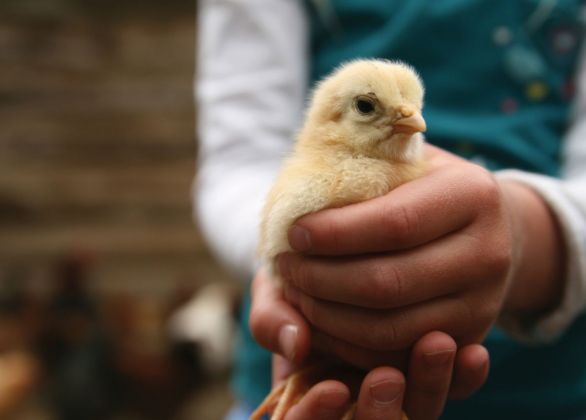Lee Yoon-Joo, director of overseas adoption programs at Holt Korea, and Paul Kim, director of Holt’s programs in Korea and Mongolia, share how the pandemic is affecting the children, families and individuals in Holt’s sponsorship program in Korea — and how Holt sponsors and donors are helping to meet their most urgent needs.

How has COVID-19 affected Korea and what is life like there right now?
PK: Korea has gone from one of the first countries in the world outside of China to be impacted by COVID-19 to a leader in fighting the spread of the virus. The nation is currently experiencing the third wave of infections, and the authorities have tightened existing regulations.

Give a Gift of Hope
Give a lifesaving or life-changing tangible gift to a child or family in need. And this holiday season, give in honor of a loved one and they’ll receive a free card!
While schools have reopened, students attend class only until noon, where social distancing and sanitation routines are strictly upheld. During the afternoon, they study online. Large gatherings are prohibited, and restaurants, cafes and other public places are limited in terms of capacity and hours.
For Koreans, the transition to mandatory mask use was less difficult, as it was the practice of many in the country to regularly use masks even before the spread of the virus. Travel within the country is discouraged, but not prohibited. All international travelers arriving in Korea are required to undergo a two-week quarantine, which is strictly enforced.

What measures has Holt Korea taken to protect Ilsan residents, women and children at the single mother’s shelters, etc. ?
PK: The Holt Ilsan Center remains closed to visitors, and only those essential to the operation of the center are permitted on site, due to the exceptional vulnerability of the residents. Ilsan residents are strictly prohibited from outside activity, and all needs are being provided by the staff.
The mother and child shelters remain closed to visitors. The facilities were on a strict lockdown for a period of time, but the mothers are now able to participate in limited attendance at academic and vocational training activities. The children remain in care on-site, to limit exposure from other children at public kindergartens and schools. All outside social activities have been suspended, including group celebrations of traditional holidays that would have typically included families who had left the centers.
The children at the Jeonju Babies’ Home have now been able to return to school on a limited basis, but the facility remains closed to visitors. All outside play and social activities have been suspended. Following guidelines issued by the Korean government, Holt-operated schools, daycare centers and community centers had closed during peak periods of concern, but are now all reopened to limited operations.
How are you working to keep children living in orphanages and with foster families safe?
LYJ: Mostly, we are focusing on prevention. Prevention is the best thing we can do now. And most of the Holt babies have weak immune systems, so COVID can be fatal to our children. Holt Korea and foster families who are taking care of the babies have minimized external activities and often purchase disinfectant products such as masks and hand sanitizer to help our children stay safe. We also support children and foster mothers getting an influenza vaccination on time.

How has COVID-19 affected sponsored children who are waiting to be adopted?
LYJ: In the beginning, overseas adoption processes were being delayed. But as many processes are back to normal, the adoption process is no longer delayed. However, there are still some changes. For example, the adoptive parents who are from overseas have to have a two-week quarantine once they arrive in Korea. Thankfully, this does not affect the children very much.
How are sponsors and donors helping to meet the most urgent needs?
LYJ: The donations from Holt sponsors are used for purchasing masks and hand sanitizers as well as the vaccinations for children in care.
PK: Their ongoing support is making it possible for Holt Korea to continue to provide children and families with the highest level of care. During this period, the cost of essential items has increased, as have the costs associated with the additional supplies needed to safeguard the children. Knowing that the faithful support of our sponsors and donors is there when needed most brings not only financial relief, but the security and confidence to know that [our staff and partners] can continue to provide this care without hesitation to any who are in need.
What would you like to say to sponsors and donors directly?
LYJ: We always thank you, sponsors, for your attention even in this difficult situation. We really appreciate you. And I hope we all get through this together.
PK: For 65 years, our mission in Korea has only been possible through the compassion, generosity and fidelity of the amazing individuals who have stepped forward to fulfill the promise made by Harry Holt decades ago. Because of your faith, we have been able to accomplish so much. … Thank you for being a part of the Holt family, for being a part of something truly amazing, and for joining with us in our mission to ensure that all children will know the loving care of a family.

Become a Child Sponsor
Connect with a child. Provide for their needs. Share your heart for $43 per month.

